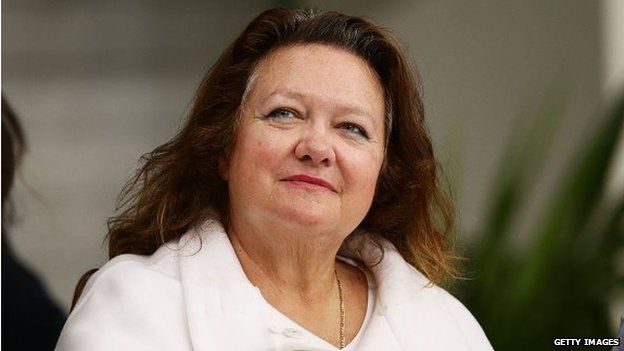Gina Rinehart: Ruling with an iron fist
- Published

For someone who is notoriously press shy, Gina Rinehart is no stranger to media attention.
A cursory search on Google brings up detailed biographies, lengthy features and several, less than complimentary articles about the mining tycoon.
Of course the media attention could be attributed to her staggering wealth. Forbes estimates Ms Rinehart's current fortune at $12bn (€11bn; £8bn), making her not just the richest woman in Australia but the richest person in Australia.
However the international press is not attracted to her money alone.
Even for a billionaire, Gina Rinehart is controversial. Well-documented are her family feuds, her legal disputes and her desire for control. Both her four children and her employees have been required to sign agreements promising not to disparage her in the press.
In this and little else, she differs greatly from her father, the late Lang Hancock who began the family business Hancock Prospecting. Unafraid of press attention he started two newspapers and would give interviews freely. In 1966 he was the subject of a BBC documentary, Man of Iron.
'Devious baby elephant'
By all accounts, Ms Rinehart grew up adoring her father. Under him she learned about mining, absorbed his political views and accompanied him on business trips around the world. Aged 12 at the time of the BBC's documentary she told the crew: "I think my father is nearly perfect."
But this infatuation did not last. Their biggest disagreement came over Rose Lacson, a maid who began working for Lang Hancock before becoming his second wife. Father and daughter fell out over this new match with Gina Rinehart attempting to sabotage her stepmother's residency application.
In February this year, the Australian TV series "House of Hancock" made much of a letter Lang Hancock wrote to his daughter in which he called her "a slothful, vindictive and devious baby elephant".
When he passed away in 1992, Ms Rinehart and her stepmother engaged in a bitter, 11-year dispute for control of Mr Hancock's assets. It ended with Ms Rinehart victorious - in sole control of the family business though now in full glare of the media spotlight.
Perhaps to lessen the unwanted attention, Ms Rinehart copied her father and bought into Australia's media. She controls 10% of the television channel Network Ten and was the single largest shareholder of Fairfax Media before selling her shares in February this year. Her relationship with Fairfax was fractious - when she refused to sign its charter of editorial independence, she was denied a seat on its board.
'Axe the tax'
But if her forays into journalism have been unsuccessful, her mining endeavours have not. Under her guidance, Hancock Prospecting has continued to expand. A new mine, Roy Hill in Western Australia, is due to start shipping iron ore to Asia later this year. The vast site is estimated to hold 2.4bn tonnes of the mineral, making it one of Australia's largest mining projects.
The past few years though have not been easy for Australia's miners. In 2010, former Prime Minister Kevin Rudd attempted to impose a "super tax" on coal and iron ore mining. Making a surprise public appearance Gina Rinehart, sporting her trademark pearls, led a crowd of over one thousand in chanting "axe the tax" ahead of a speech by Mr Rudd in Perth.
The chanting, it seems, worked. The tax was dropped and Mr Rudd was ousted by his party soon afterwards.
Victory then for Ms Rinehart, a climate change sceptic who, in 2012, applauded African workers for being "willing to work for less than $2 per day".
Though spared the super tax, miners now face plummeting iron ore prices. In April, Australia's Treasurer Joe Hockey said the mineral could fall to a measly $35 a tonne. Compare that to $120 a tonne, iron ore's price in 2013, and it's easy to see why one analyst called the timing of the Roy Hill mine opening "abominable".
But there is another factor that could jeopardise Roy Hill's potential success. On 28 May, Ms Rinehart lost a long-running legal battle to prevent her children gaining control of a trust set up for them by their grandfather. Her eldest daughter Bianca now controls a 24.3% stake in Hancock Prospecting.
Once again, Gina Rinehart finds herself under the media's spotlight. But as she prepares to surrender part of her beloved company, it seems unlikely that she will escape it any time soon.
- Published9 July 2012
- Published2 July 2013
- Published14 April 2015
- Published10 May 2010
- Published14 April 2023